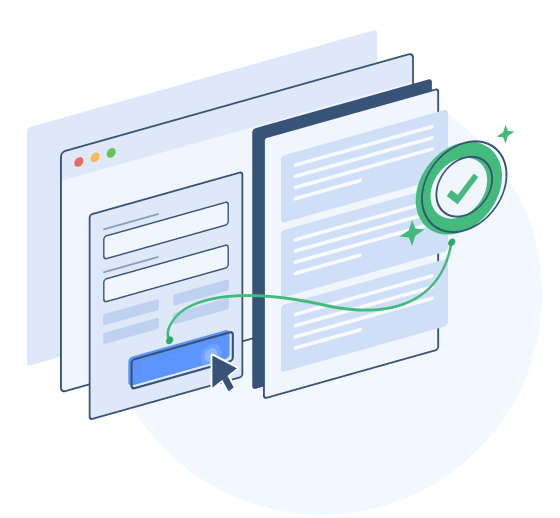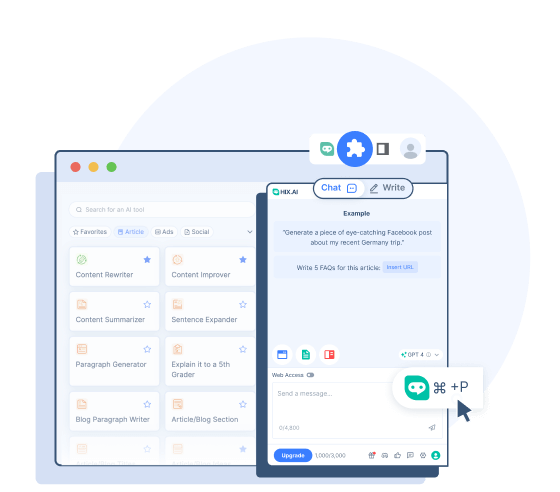If I asked you how you were doing, how would you reply?
Hopefully, you'd say that you're feeling 100% at the moment and excited to learn more about professional email etiquette. If I started an email and said, "I hope you are well," would you answer?
Can you tell the difference? (Hint: It's the question mark). Yes, for many people (English language speakers and non-English language speakers), responding to "I hope you're well" in an email is a challenge. What do they mean, and do they care?
We're going to answer that question and a whole lot more in this guide on how to respond to "I hope you're doing well" emails. Also, we will give 10 "I hope this email finds you well" alternatives.
Before we start, we genuinely hope you are well and will enjoy our time together.
Create Professional Emails with Ease
Before you explore our curated "I hope this email finds you well" alternatives, streamline your email writing process by using our free AI email generator to craft perfect emails tailored to your needs in seconds.
What does "I hope you are doing well" mean?
If someone asks you, "How are you feeling?", for example, they're expecting a response.
When people say "I hope you are doing well" in an email, there is no question mark.
This can throw people. They think: Are they asking me if I am well, or is it just a phrase that people say?
Well, we're sorry to say it can be both!
Some people will use "I hope you are well" in an email as a polite opener. They're not interested in how you are but like the way it breaks through the professional barrier and makes it personal.
But, if you've been off work sick, for example, the phrase takes on a whole new meaning. Or if a friend is emailing you after the death of a friend, family member, or favorite pet, then they probably expect an answer.
Should I respond if someone asks me?
English is a tricky language, and many phrases can have more than one meaning.
Unless you can discern exactly the content that the question has been asked, we recommend you always acknowledge it and reply.
That doesn't mean providing a detailed rundown of your health or a link to your dental records, but you can – and should – respond.
How? Let's stop telling and start showing, with 10 sample responses to "I hope this email finds you well" emails.
10 sample responses to "I hope this email finds you well" emails
You may think there are only a couple ways to respond to "I hope all is well" in an email – but you'd be wrong. Here, we're going to show you 10 strategies you can use when responding to an email.
Here's the email we received:
Hi David,
I hope you're well. We're running late on the project, and I need your help. Can you let me know you're availability for a call?
Here are 10 responses...
#1 Throw it straight back
"I'm great, thanks. I hope you're well, too."
#2 Answer honestly
"I'm sorry to say that I'm not feeling that great at the moment..."
#3 Acknowledge and move on
"I'm well, thank you. I understand the project is progressing, and I'd be happy to help..."
#4 Make a joke
"I'll be honest and say I've never felt worse, but I'm still alive, so I guess that's something..."
#5 Ignore it completely
"I'm 100% here to support you and the program. What do you need me to do?"
#6 Delay until after the details
"Thanks for the program update; as you know, I'm always here if you need it. As for me, I'm really well, thanks. How are you?"
#7 Explain you're still away
"Thanks for your email. I'm doing really well, thanks. You? I'm currently away at the moment, so I'll get back to you when I return."
#8 I'm on vacation reply
"I'm currently on vacation, so I'm doing great! I'll message you back when I return. Hope you're well."
#9 I've left the business
"Thanks for your email. I've now left the business and am working at (company). I suggest
forwarding your message to (insert person).
#10 Response to a friend
"It's great to hear from you. I've not been so well recently, but getting better. How are you and the family?"
Did you think there were so many ways to respond to4 words in an email?
HIX Email WriterWrite/Reply to Emails Instantly
Type // to draft emails in no time
Get tailored replies with one click
Quickly summarize a received email
5 expert tips on "I hope all is well" messages
If you’ve been reading and taking notes (or copying and pasting!) you should be fine creating your own email replies. But we’re not stopping with our sample! Oh no! We’ve asked our email pros to put their minds to the task and provide 5 tips for better messages. You’re welcome!
- You don't know what they mean (so assume they care) – Some people are selfish, but most people care. If they ask you how you are in an email, acknowledge the request, express gratitude and respond!
- Think about context – Who is sending the message and what do they mean? Think about whether they really care about you or are just going through the motions. The samples above all respect the context (formal, friendly, honest, or guarded) and it shows. Before bothering to bare your soul, consider what kind of reply they're expecting (if any!).
- Be sensitive – If you know they've experienced poor health or the recent death of a loved one, be careful before asking back. They may not want to speak about their experience and could get upset by your request. Think before sending.
- Learn when to ignore – If someone has sent you a complaint, a stern comment, or an urgent instruction, it's safe to say they probably don't care how you are. In these circumstances, you can safely ignore it and focus on setting things straight and getting the job done.
- Use HIX.AI – Still don't feel confident responding to "I hope all is well", then let technology take the strain. HIX.AI's AI email writing assistant can create professional email responses while you wait. You can make as many suggestions as you need to optimize your emails until you're 100% happy. It's all part of the service!
Read also: How to write a friendly & gentle reminder email (5 templates)
10 “I hope this email finds you well” alternatives
We’ve shown you how to respond to “I hope you are well” in your emails, now we’ll provide you with some alternatives you can use in its place. Instead of opening your emails with “I hope you are well” you can drop these in instead.
There are several strategies you can use, including being personal, or ultra-professional. You can get straight to the point or (if you’re feeling brave) even be funny!
There’s nothing wrong with starting an email with “I hope you’re well”, it’s just that if you overuse it, then it loses its power.
You can keep your emails fresh with these 10 options:
- How are you doing today?
- I’m really excited to email you today, because…
- I’m going to get straight to the point…
- Is everything ok with you?
- I know you’re sick of hearing from me, but…
- I know you’re waiting for my email.
- Congratulations on your recent business win!
- I’m going to keep this brief, as I know you’re busy.
- We met at…
- Are you interested in a new business opportunity?
These illustrate some suitable alternatives to “I hope this email finds you well”. They work because they’re equally as polite, but they actually have meaning. The choice depends on the content of your message, and the person you’re messaging.
When writing emails, we can often go into autopilot and use simple stock phrases (like “I hope you’re well”), which can make our emails come across as a little unfocused and (yes) lazy. If you find that some of these phrases are slipping into your emails, then identify this at the proofreading stage and act.
One of the great things about HIX.AI email generator is its ability to offer alternative phrases for professional emails. Instead of always opening an email with “I hope all is well”, the AI-powered tool will provide you with an almost infinite number of options. It’ll keep your emails focused, fresh, and totally on-point.
Conclusion
We’re sensitive people, and if someone asks how we are, we want to know if they genuinely mean it. Or are they robots putting together emails from cliches and well-worn phrases. In the end, it doesn’t actually matter if they do or not (sorry). If you get an email with this well-worn phrase in it, then acknowledge it, respond, and ask them how they are, leaving you to get on with the rest of your email.



